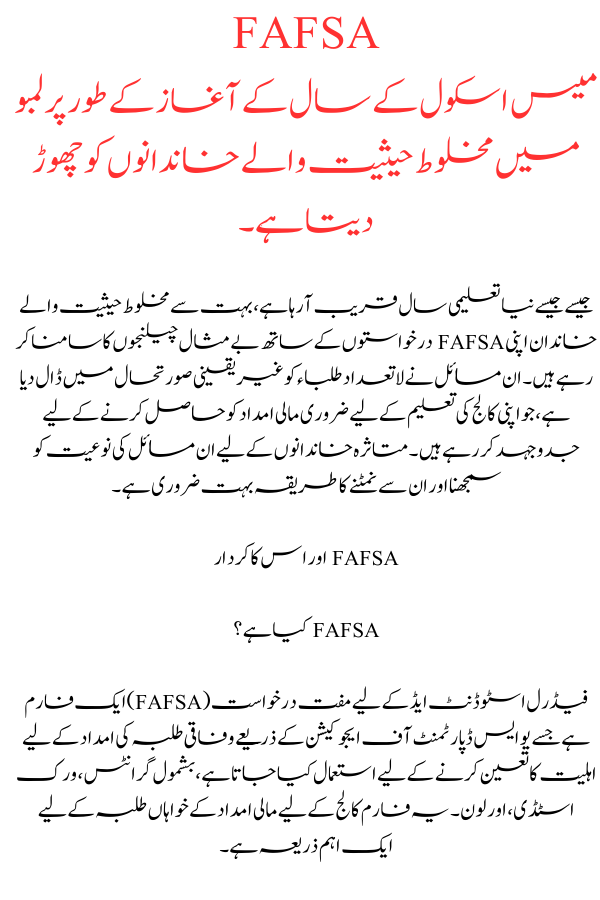FAFSA Mess Leaves Mixed-Status Families in Limbo as School Year Looms
As the new school year approaches, many mixed-status families are facing unprecedented challenges with their FAFSA applications. These issues have left countless students in a state of uncertainty, struggling to secure the financial aid necessary for their college education. Understanding the nature of these problems and how to address them is crucial for affected families.
FAFSA and Its Role
What is FAFSA?
The Free Application for Federal Student Aid (FAFSA) is a form used by the U.S. Department of Education to determine eligibility for federal student aid, including grants, work-study, and loans. This form is a critical tool for students seeking financial assistance for college.
Purpose and Importance of FAFSA
FAFSA serves as the gateway to federal financial FAFSA Mess Leaves Mixed-Status Familiesaid, which can significantly reduce the cost of higher education. By assessing a family’s financial situation, FAFSA helps determine the amount of aid a student is eligible to receive, making college more accessible to many.

Challenges Faced by Mixed-Status Families
Definition of Mixed-Status Families
Mixed-status families are households where some members are U.S. citizens or legal residents while others are undocumented or have different immigration statuses. This complexity can create significant hurdles when applying for financial aid.
Specific Issues Encountered During FAFSA Application
Mixed-status families often face difficulties due to discrepancies in immigration status documentation and eligibility requirements. For instance, while U.S. citizens and legal residents can access federal aid, undocumented family members cannot, complicating the process of reporting household income and filling out the FAFSA accurately.
Impact on Students and Families
The FAFSA issues have placed immense emotional and financial strain on students and their families. The uncertainty surrounding their aid eligibility has led to stress and anxiety about how they will afford college. Families are worried about whether their children will be able to attend their chosen schools or if they will need to seek alternative funding solutions.
Potential Delays in College Enrollment
Due to these complications, many students face delays in their college enrollment process. Without a clear understanding of their financial aid status, students may be unable to finalize their college plans or may have to make last-minute changes to their education path.
Government and Institutional Responses
In response to the FAFSA issues, the Department of Education has taken steps to address some of the challenges faced by mixed-status families. This includes providing additional guidance and extending deadlines where possible. However, many families still find themselves struggling with the complexities of the application process.
Responses from Educational Institutions
Colleges and universities are also stepping in to help affected students. Some institutions have offered additional support, such as personalized assistance with FAFSA applications and temporary financial aid solutions to bridge the gap until federal aid issues are resolved.
Recommended Actions for Affected Families
For families experiencing FAFSA-related issues, it’s important to take several proactive steps. First, ensure that all required documentation is accurate and complete. Contact the financial aid office at your chosen institution for personalized support. Additionally, consider seeking assistance from educational consultants or legal advisors specializing in immigration and financial aid matters.
Resources Available for Assistance
Various resources are available to help families navigate FAFSA issues. Organizations like the College Board and financial aid advisors FAFSA Mess Leaves Mixed-Status Familiesoffer guidance and support. Additionally, local community groups and legal aid organizations may provide valuable assistance for mixed-status families.
Advocacy Groups Working for Change
Several advocacy groups are actively working to improve the FAFSA process for mixed-status families. These organizations are pushing for policy changes and providing support to affected families to ensure they receive the financial aid they need.
FAQs
Are there any special resources for mixed-status families?
Yes, various resources are available for mixed-status families, including educational consultants, advocacy groups, and legal aid organizations specializing in financial aid and immigration issues.
How can I check the status of my FAFSA application?
You can check the status of your FAFSA application by logging into your FAFSA account on the Federal Student Aid website. This will provide updates on your application status and any required actions.
What impact does FAFSA have on college admission?
FAFSA determines eligibility for federal financial aid, which can impact your ability to afford college. While FAFSA itself does not affect admission decisions, financial aid availability can influence your choice of college.
How can advocacy groups help with FAFSA issues?
Advocacy groups can offer support through legal assistance, policy advocacy, and resources to help families navigate the FAFSA process. They work to address systemic issues and provide practical help for affected students and families.
